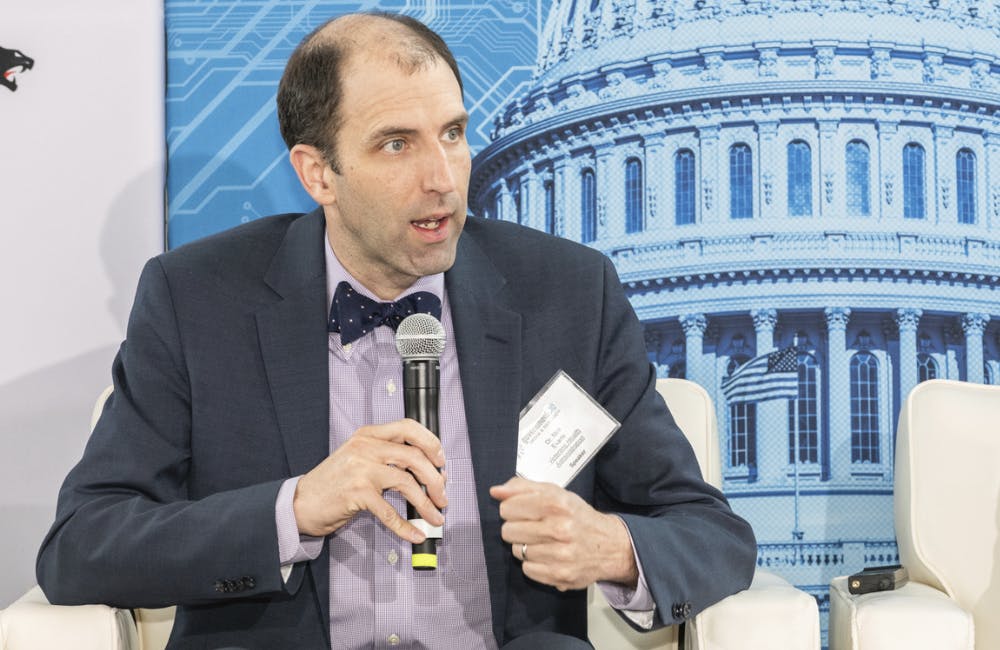Connolly: COVID-19 Underscores Need to Modernize Government IT
The pandemic has pushed mass reliance on technology across America, revealing the need for heightened and continued IT modernization efforts.

The mass reliance on government digital services and shift to telework for federal agencies and workers across America due to COVID-19 highlights that technology is critical to the enterprise and must be funded accordingly across the government, said Rep. Gerry Connolly.
The COVID-19 pandemic has exposed much lack of technological preparedness across the country for remote continuation of work and other essential components to the government, economy and society, Connolly said in a MeriTalk webinar Thursday. He highlighted that the sudden technological challenges that have come with COVID-19 highlight the long-needed importance of bolstering IT infrastructure and resources.
“A lot of managers still approach IT almost like it’s a commodity — it’s something to be ordered and purchased and installed,” Connolly said. “It’s actually a whole process that can transform how we do business and how we serve our customers — in this case, the U.S. population. … Technology is key to the entire enterprise.”
Connolly stressed that certain failures to upgrade government IT before the pandemic have exacerbated crises that COVID-19 has created. Some state governments, he said in an example, did not make enough IT investments before the pandemic to upgrade their unemployment systems to support mass unemployment filings — which reached 26 million this week nationwide.
“The unemployment systems are crashing; they can’t handle the volume,” Connolly said. “Seventeen or 18 states, last time I checked, still use COBOL [coding], so they don’t have trained personnel, they don’t have updated technology and they just don’t have the capacity as a result.”
Although the $2 trillion COVID-19 relief fund passed last month allocated billions toward IT initiatives — from telehealth and telework to cybersecurity and modernization — Connolly said that he intends to continue pushing for oversight of broader federal IT modernization progress to ensure long-term support of the technology federal agencies, employees and individuals across America need to remain safe, both during and beyond the pandemic.
This oversight will namely take place through FITARA, or the Federal IT Acquisition Reform Act. Connolly, who also chairs the House Oversight and Reform House Government Operations Subcommittee, said that he intends to still hold the committee’s semiannual FITARA oversight hearing in June, if possible. The hearing will be the 10th of its kind, scoring each federal agency on IT modernization progress based on a number of criteria.
“We have surely made progress, and in terms of who we are, who the CIO reports to and elevating the importance of that [IT] portfolio, but also in terms of retiring legacy systems, consolidating data centers, moving to the cloud, and yes, deploying the technology at hand to do things like telework,” Connolly said.
Sustaining federal IT modernization efforts will continue to expand the number of federal personnel and contractors who will be able to work remotely and can thereby keep them safe throughout the pandemic, but also support longer-term instances when those employees need to work from home, Connolly added.
“There is still about 1.3 million federal employees who qualify or want to qualify for telework and are kind of left in limbo because of lack of guidance, lack of infrastructure,” Connolly said. “[Telework] is a good thing in terms of productivity and morale.”
Members of Congress, including Connolly, are some of those federal employees who are still required to come to work amid the pandemic quarantines and lockdowns. He joined the webinar from his office on Capitol Hill, where he and most of the House will vote to add nearly a half-trillion more dollars in relief funding for small businesses and hospitals Thursday afternoon, following the Senate’s Tuesday vote of approval.
“These are very strange circumstances for Congress, which has not yet figured out how to deploy technology to vote safely but remotely,” Connolly said. “There’ll be at least 360 members of Congress coming back today to vote, and that presents a safety hazard for our staff, for Capitol Hill police, for people on airplanes and trains, and for members and their families as well.”
This is a carousel with manually rotating slides. Use Next and Previous buttons to navigate or jump to a slide with the slide dots
-

Trump's Return to Office Sparks Focus on AI Infrastructure
A potential AI czar and prior AI executive orders lead to new considerations for R&D and energy infrastructure.
7m read -

VA Focuses on Continuous Improvement for 2025 EHR Rollout
VA plans to resume rollout of its EHR in FY 25, focusing recent feedback to drive continuous improvement amid the presidential transition.
4m read -

Trump's Intelligence Pick Backs Cybersecurity, Tech Accountability
The former congresswoman has called for improving cyber defenses and advocated for accountability in federal tech and data practices.
2m read -

Trump's Education Nominee Calls for Tech Vocational Programs
Linda McMahon has called for investments in the tech workforce and small businesses to remain competitive.
3m read








